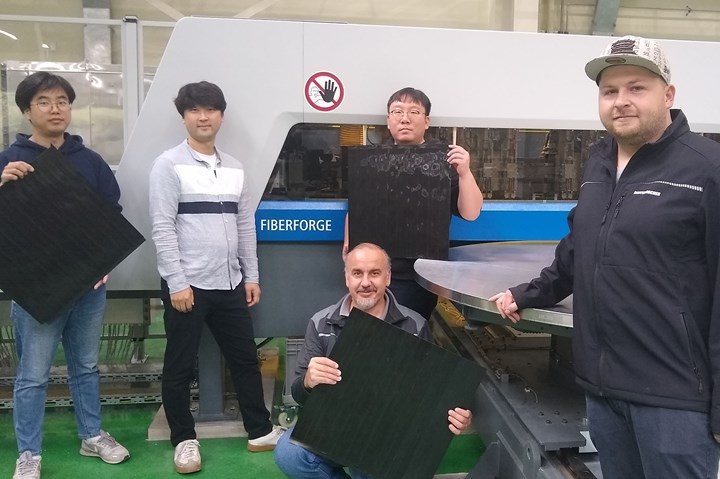Dieffenbacher Fiberforge system contributes to South Korean UNIST research
Ordered from Dieffenbacher in 2019, the tape laying system has enabled the advancement of research for companies in the automotive and aerospace industries.

The UNIST team. Photo Credit: Dieffenbacher
A Fiberforge tape laying system from Dieffenbacher (Eppingen, Germany) — which manufactures near-net-shape laminates from continuous fiber-reinforced glass or carbon fiber tapes — is helping the South Korea Ulsan National Institute of Science and Technology (UNIST) advance its research for companies in the automotive and aerospace industries.
Accepted and in use since mid-October 2020, the tape laying system ordered by UNIST in 2019 was the first Fiberforge order for Dieffenbacher in this region. Installation and commissioning of the tape laying system began in August 2020.
“We develop new processes and applications, mainly for companies in the automotive and aerospace industries,” says Prof. Young-Bin Park, head of the UNIST Composites Research Center. “We were looking for a highly precise and economical tape laying system and found it at Dieffenbacher. Fiberforge takes our research to a whole new level.
“Despite the COVID-19 pandemic, which initially caused a slight delay in the start of construction work, the rest of the project went absolutely smoothly,” he adds. “Many thanks to the entire Dieffenbacher team for the fast and uncomplicated installation and commissioning despite the difficult conditions.”
According to Dieffenbacher, the UNIST project underscores the versatility of the Fiberforge technology. Said to be the world’s fastest tape laying system, the company says the technology is suitable for both the mass production of lightweight components and research for new processes. More than 10 systems are in use in production worldwide. In addition to UNIST, seven other research institutes are equipped with Fiberforge technology.
Related Content
-
Composites manufacturing for general aviation aircraft
General aviation, certified and experimental, has increasingly embraced composites over the decades, a path further driven by leveraged innovation in materials and processes and the evolving AAM market.
-
Owens Corning initiates review of strategic alternatives for glass fiber business
Owens Corning considers alternative options like a potential sale or spin-off as part of its transformative move to strengthen its position in building and construction materials.
-
Automotive chassis components lighten up with composites
Composite and hybrid components reduce mass, increase functionality on electric and conventional passenger vehicles.
















